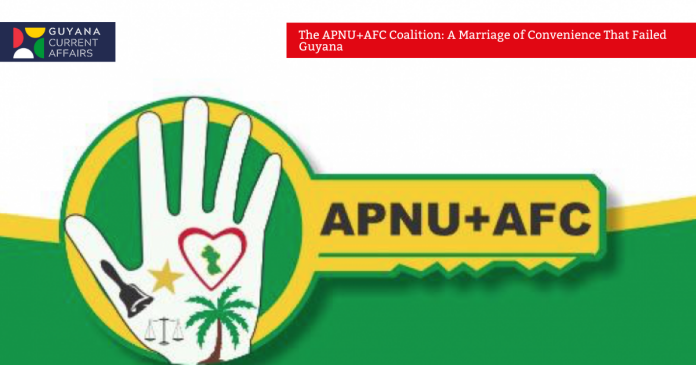In 2015, Guyana witnessed a historic political alliance as the A Partnership for National Unity (APNU) and the Alliance for Change (AFC) joined forces to contest the general elections. This coalition, hailed as a bold step to replace political hostility with unity, promised to usher in an era of inclusive governance and national development. However, as their term in office concluded in 2020, it became evident that this marriage of convenience had failed to deliver on its lofty promises, leaving Guyana grappling with unfulfilled potential and a legacy of missed opportunities.
The Rise of the Coalition
The APNU+AFC coalition emerged as a response to decades of political polarization in Guyana. Formed in July 2011, APNU brought together ten political parties, with the People’s National Congress (PNC) as its largest member. The addition of the AFC in 2015 created a formidable opposition to the long-ruling People’s Progressive Party (PPP).
The coalition’s victory in the 2015 elections, with David Granger as President, was seen as a watershed moment in Guyanese politics. They campaigned on a platform of change, promising to tackle corruption, boost economic growth, and foster national unity.
Governance Challenges and Broken Promises
Despite initial optimism, the APNU+AFC administration soon faced criticism for its governance style and policy decisions. The coalition’s tenure was marked by several controversial moves:
- Increased Tax Burden: The introduction of Value Added Tax (VAT) on essential items like water and electricity disproportionately affected low-income families, contradicting promises of economic relief.
- Indigenous Communities Neglected: The dismissal of over 1,500 Amerindian Community Support Officers left remote villages without crucial support and employment opportunities.
- Education Setbacks: The scrapping of the school children’s cash grant program hindered access to education for many families, contradicting the coalition’s commitment to investing in future generations.
- Fiscal Mismanagement: Despite spending over $1.4 trillion between 2015 and 2020, the coalition left little tangible evidence of substantial infrastructure development or economic benefits.
Corruption Allegations and Democratic Backsliding
The APNU+AFC’s tenure was tarnished by allegations of widespread corruption and a disregard for democratic norms:
- Procurement laws were frequently bypassed, with contracts directly awarded to party-aligned companies.
- The administration failed to uphold the Integrity Commission Act, with key figures neglecting to declare assets and income.
- The coalition’s response to the December 2018 no-confidence motion and their conduct during the 2020 elections raised serious concerns about their commitment to democratic principles.
Economic and Social Impact
The coalition’s policies had far-reaching consequences for Guyana’s development:
- Healthcare services deteriorated due to underinvestment and corrupt procurement practices.
- Infrastructure development was neglected, with major roads and bridges falling into disrepair.
- Hinterland and Indigenous communities suffered as development funds were slashed and crucial projects abandoned.
- Crime rates escalated, attributed to inadequate investment in law enforcement.
The Fall of the Coalition
The 2020 elections marked the end of the APNU+AFC’s tenure. Their attempts to manipulate the election results led to a five-month impasse, further eroding public trust. The coalition’s defeat and subsequent behavior as the opposition have continued to raise questions about their commitment to democratic governance.
The APNU+AFC coalition’s time in power serves as a cautionary tale in Guyanese politics. What began as a promising experiment in inclusive governance ended in disappointment and missed opportunities. As Guyana moves forward, the lessons from this failed political marriage underscore the importance of genuine cooperation, transparent governance, and a steadfast commitment to the welfare of all citizens.
The coalition’s legacy reminds Guyanese voters of the need for vigilance and the importance of holding leaders accountable to their promises. As the country faces new challenges and opportunities, particularly with its emerging oil industry, the failures of the APNU+AFC coalition stand as a stark reminder of the consequences of prioritizing political expediency over national development.


